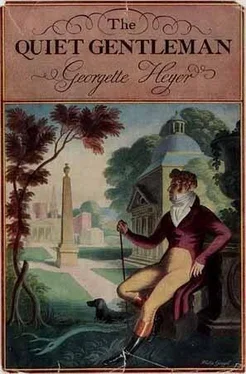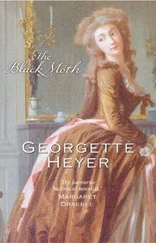It was not to be expected that the second Lady St. Erth would immediately greet with approbation the inclusion into her home of the son of so unsteady a man; but even she was soon brought to acknowledge that Theo inherited none of his father’s instability. He was a stolid, even-tempered boy, and he grew into a taciturn but dependable young man. The Earl, who sent his own sons to Eton, in the tradition of his family, caused Then to be educated at Winchester. He did not, like his cousins, go to Oxford, but instead, and by his own choice, applied himself to the task of learning the business of his uncle’s agent. So apt a pupil did he prove to be, that when the older man resigned he was able and ready to succeed him. In a very short space of time he was managing the Earl’s estates better than they had been managed for many years, for he was not only capable and energetic, but his subordinates liked him, and he was devoted to the Frant interests. His uncle relinquished more and more of his affairs into his hands, until it became generally understood that Mr. Theo must be applied to for whatever was needed.
Gervase, knowing this, had expected his father to have left him more handsomely provided for. He said as much, looking at his cousin in a little trouble, but Theo only smiled and said: “You may be thankful he did not! I had no expectation of it.”
“He might have left you an estate, I think.”
“Studham, perhaps?”
“Well, I had as lief you had it as Martin,” said Gervase frankly. “I was really thinking of the property he bought towards Crowland, however. What’s the name of the manor? — Evesleigh, is it not? Shall I make it over to you?”
“You shall not! There has been enough cutting-up of the estate already.”
“But, Theo, you cannot spend all your life managing my property!”
“Very likely I shall not. I have a very saving disposition, you know, and you pay me a handsome wage, besides housing me in the first style of elegance, so that I am not put to the expense of maintaining an establishment of my own!”
Gervase laughed, but shook his head. “You cannot like it!”
“I like it very well indeed, thank you. Stanyon has been as much my home as yours, recollect!”
“Much more,” said the Earl.
“Yes, unfortunately, but you will forget the past. Do you mean to allow Martin to continue here?”
“I had not considered the matter. Does he wish to?”
“Well, it will certainly not suit him to remove to Studham!” replied Theo. “I do not know how he is to continue hunting with the Belvoir from Norfolk! He would be obliged to put up at Grantham throughout the winter, and I own it would be uncomfortable. There is, moreover, this to be considered: when Cinderford died, your father permitted our aunt to take up her residence there, and it would be hard, I daresay, to prevail upon her to remove.”
“Impossible, I imagine. He may remain at Stanyon, if only he can be persuaded to treat me with the semblance at least of civility. There appears, at the moment, to be little likelihood, however, of his doing so.”
But when the Earl presently joined the rest of his family in one of the parlours on the entrance floor, where a light luncheon had been set out on the table, he found the Dowager and her son apparently determined to be amiable. That he had been the subject of their conversation was made manifest by the conscious silence which fell upon them at his entrance. The Dowager, recovering first from this, said with the utmost graciousness that she was glad to see him, and invited him to partake of some cold meat, and a peach from his own succession-houses. These, which had been installed at her instigation, were, she told him, amongst the finest in the country, and could be depended on to produce the best grapes, peaches, nectarines, and pines which could anywhere be found.
“The gardens, of course, cannot be said to be at their best thus early in the year,” she observed, “but when you have had time to look about you, I trust you will be pleased with their arrangement. I spared no pains, for I dote upon flowers, and I fancy something not altogether contemptible has been achieved. Indeed, the Duchess of Rutland, a very agreeable woman, has often envied me my show of choice blooms. Martin, pass the mustard to your brother: you must perceive that it is beyond his reach!”
This command having been obeyed, she resumed, in the complacent tone habitual to her: “Unless you should prefer to speak with Calne yourself, St. Erth, which I cannot suppose to be very likely (for gentlemen seldom interest themselves in such matters), I shall request him to devise one or two elegant bowls for the State saloons. It is not to be supposed that people will care to be backward in paying their morning-calls, now that it is known that you are in residence; and very few families, you know, have as yet removed to the Metropolis. We must not be found unprepared, and, I do not by any means despair of Calne’s achieving something creditable.”
“Am I to understand, ma’am, that I must expect to receive visits from all my neighbours?” asked Gervase, in some dismay.
“Certainly!” said the Dowager, ignoring a muffled crack of laughter from her son. “It would be very odd in them not to render you the observances of civility. It will be proper for you to hold a few dinner-parties, and now that I have put off black gloves I shall not object to performing my duties as hostess. Stanyon has ever held a reputation for hospitality, and I fancy that my little parties have not been, in the past, wholly despised. I am sure nothing is further from my thoughts than a disposition to meddle, but I would advise you, my dear St. Erth, to allow yourself to be guided in these matters by me. You cannot be expected to know who should be honoured by an invitation to dine with you, and who may be safely fobbed off with a rout-party, or even a Public Day.”
“A Public Day!” repeated Gervase. “You terrify me, ma’am! What must I do upon such an occasion?”
“Oh, you have merely to move about amongst the company — your tenants, you know! — saying something amiable to everyone!” said Martin. “The most tedious affair! I have always contrived to be a couple of miles distant!”
“What admirable good sense! Pray, into which class may Miss Morville, and her peculiar parents, fall, ma’am?”
“That,” responded the Dowager, “is a question that has frequently exercised my mind. There can be no denying that the Morvilles — they are able, you know, to trace their lineage back to the time of the Norman Conquest — must be thought to rank amongst those of the best blood in the country; but there can be no denying that the opinions held by Mr. Hervey Morville — and, I feel compelled to say, by his lady, though she too is of excellent birth, so that one is quite in a puzzle to determine what circumstances can have prevailed upon her to turn to the pen — that these opinions, as I have observed, must cause the most liberally-minded person to hesitate before including him in any select invitation. A shocking thing for his family, you know! He was actually acquainted with Home Tooke! However, the late Earl was used to say that he had a well-informed mind, and we have been used to invite him, and his lady, to dine with us from time to time. His daughter is quite a favourite with me; a delightful girl!”
At this point, the eyes of the half-brothers met. The Earl was able to command his features, but Martin choked over a mouthful of cold beef. The Dowager said indulgently: “I do not assert that she is beautiful, but she is a very pretty-behaved young female, and one that will do very well for poor Theo. I have a great regard for Theo, and I should be happy to see him comfortably established.”
Читать дальше






